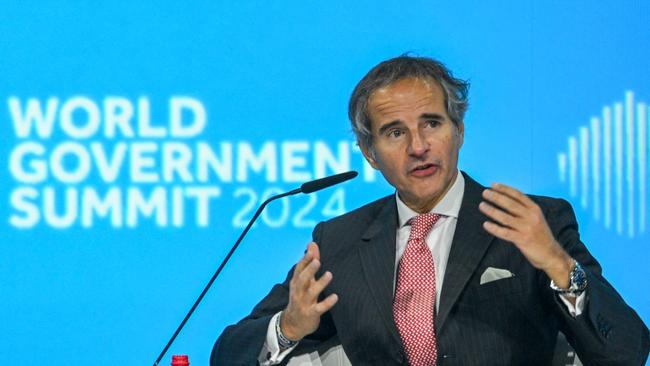Iran reduces near weapons-grade nuclear stockpile
Move could signal an effort to de-escalate nuclear tensions with Washington.

Iran reduced its stockpile of near-weapons-grade nuclear material even as it continued expanding its overall nuclear program, the UN’s atomic watchdog said on Monday, marking a surprise step that could ease tensions with Washington.
The move comes at a moment when Iran and the US have sought to avoid direct confrontation in the regional conflict that grew out of Hamas’s terrorist attack on Israel on October 7 and Israel’s aggressive response.
However, Iran-backed militias have attacked US forces in the region and the U.S. and U.K. are conducting strikes on the Houthis in Yemen, a pro-Iran group that has been attacking international vessels in the Red Sea.
Iran’s decision to reduce its stockpile of 60 per cent-enriched uranium over the last 3½ months, by deliberately diluting the material by mixing it with low-grade 2 per cent material, is the first time the International Atomic Energy Agency has reported a quarterly drop in Tehran’s highly enriched stockpile since Iran started producing 60 per cent material in 2021.
Iran carried out the dilutions twice since the start of the year. Last summer, it also diluted a small amount of 60 per cent material.
Iran, which says its nuclear program is for purely peaceful, civilian purposes, is the only country without nuclear weapons that produces 60 per cent-enriched uranium.
The confidential IAEA reports on Iran, circulated to member states on Monday, described a clearly expanding nuclear program and detailed Tehran’s continued refusal to co-operate with the agency on basic issues, such as banning some of the IAEA’s inspectors from the country.
IAEA Director General Rafael Grossi said in an interview that Iran’s reduction of highly enriched uranium represented “marginal oscillations” in Tehran’s stockpile.
“We do not see or take this as a fundamental indication of a trend,” he said. Iran still has enough near-weapons-grade material to fuel almost three nuclear weapons, underlining its status as a threshold nuclear-weapon state.
There was no immediate comment on the reports from U.S. officials. Last year, as part of an attempted de-escalation of tensions between Washington and Tehran, Iran significantly slowed its build-up of 60 per cent-enriched uranium. However, at the time, Iran didn’t even go as far as Washington had hoped: that Iran would stop adding to its 60 per cent stockpile.
The de-escalation efforts, which grew out of indirect talks between the U.S. and Iran hosted by Oman, collapsed after Hamas attacked Israel on October 7, killing 1200 Israelis. The attack drew praise from Iran’s leaders.
The IAEA said Iran had reduced its stockpile of 60 per cent-enriched uranium by 6.8 kilograms to 121.5 kilograms since late October.
U.S. officials say it would take Iran less than two weeks to convert that amount into weapons-grade 90 per cent-enriched material. By the IAEA’s definition, Iran needs a minimum of 42kg of uranium enriched to 60 per cent to make a nuclear bomb.
The reports showed that Iran continued to build up its overall stockpile of enriched uranium. In particular, Tehran grew its stockpile of 20 per cent-enriched uranium by over 25 per cent to 712 kilograms. Iran could turn that material into weapons-grade material in a couple of months, experts say.
US officials have said Iran could field a nuclear weapon within several months. However, they have said there is currently no evidence that Iran is working on weaponising a bomb despite recent comments by Iranian officials hinting that they have mastered most of the process.
The Biden administration has upheld a longstanding US pledge that it will prevent Iran from obtaining a nuclear weapon. However, the US and its European allies have floundered in responding to Tehran’s expanding nuclear work.
Iran started building up its nuclear program again after then-president Donald Trump in 2018 withdrew the US from the 2015 nuclear deal, which lifted international sanctions on Tehran in exchange for tight but temporary limits on its nuclear work.
The Biden administration failed in its efforts to revive the 2015 nuclear deal with Iran, with negotiations collapsing in mid-2022.
European diplomats have said in recent weeks they were trying to get the Biden administration to focus again on Iran’s nuclear program. With the US dealing with the Gaza crisis and the war in Ukraine, the diplomats said they are concerned Washington’s approach has boiled down to hoping Tehran provokes no nuclear crisis until after November’s presidential elections.
“Iran needs a distracted United States. By taking what some will see as a de-escalatory step, Iran may hope that any urgency the US and Europe may otherwise have felt regarding Iran’s nuclear program will dissipate, especially with so many other regional and global crises playing out,” said Michael Singh, a former senior director for Middle East affairs at the National Security Council, who is now at the Washington Institute think tank.
The IAEA has said Tehran’s nuclear build-up and its failure to co-operate with the agency has created a dangerous situation that needs to be addressed by major powers.
The agency has repeatedly warned that because Iran has removed some cameras that were assessing various parts of Iran’s nuclear-related work and withheld other information from the agency, it may not be able to assert in the future that Tehran hasn’t diverted nuclear material to a covert weapons program.
“It is quite difficult but not impossible” to reconstruct Iran’s activities, Mr Grossi said.
The Wall Street Journal



To join the conversation, please log in. Don't have an account? Register
Join the conversation, you are commenting as Logout